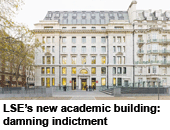An investigation by a former lord chief justice into links between the London School of Economics (LSE) and deposed Libyan dictator Muammer Gaddafi’s regime has reached “damning” conclusions.
 The highly critical investigation, carried out by Lord Woolf, was ordered in March after attention fell on multiple links between the school and the Libyan dictatorship following the killing of hundreds of protesters in the early stages of the uprising in the Middle Eastern state.
The highly critical investigation, carried out by Lord Woolf, was ordered in March after attention fell on multiple links between the school and the Libyan dictatorship following the killing of hundreds of protesters in the early stages of the uprising in the Middle Eastern state.
The report was due to be released on November 30, after Times Higher Education (THE) had gone to press, but it is understood to conclude that:
• Failures of governance, management and communication meant that members of the LSE council were not fully informed of fears that a £1.5 million (Rs.12.3 crore) donation from the Gaddafi regime could have been funded by bribes from Western companies seeking Libyan contracts.
• Sir Howard Davies, the former director of the school who resigned at the height of the scandal in March, was ultimately responsible for this failure to fully inform the council.
• There was no one at the LSE keeping track of the institution’s many connections with the Gaddafi regime, which “grew like Topsy”.
• The acceptance of a £2.2 million (Rs.18 crore) contract to train Libya’s elite civil servants was “clearly of merit” and a service the school should be performing.
• Saif al-Islam Gaddafi, Colonel Gaddafi’s son, was receiving more help with his Ph D than the LSE was aware of, including an arrangement whereby he would dictate his thesis to advisers who would then write it up.
Judith Rees, interim director of the LSE, says that “on the way in which we handled the donation from the Gaddafi International Charity and Development Foundation, Lord Woolf is damning”. “We have already been working on an up-to-date policy, with a clear procedure for scrutiny and clear lines of responsibility as set out by Woolf,” she says, adding that the report marks a “sad day” for the school and the episode “will raise questions for the higher education sector as a whole”.
LSE has accepted all 15 of Lord Woolf’s recommendations and a subcommittee of its council will now look into how it will implement a code of ethics. Prof. Rees has told all departmental heads that they should cease to solicit donations, a role that should instead be handled by the LSE’s development office.
(Excerpted and adapted from Times Higher Education)